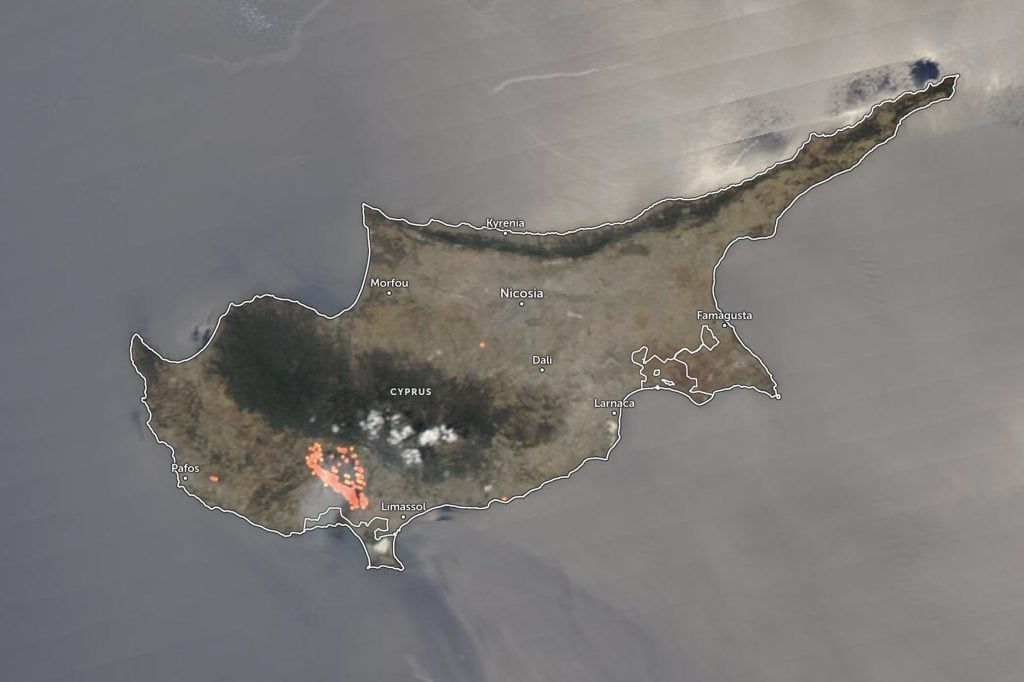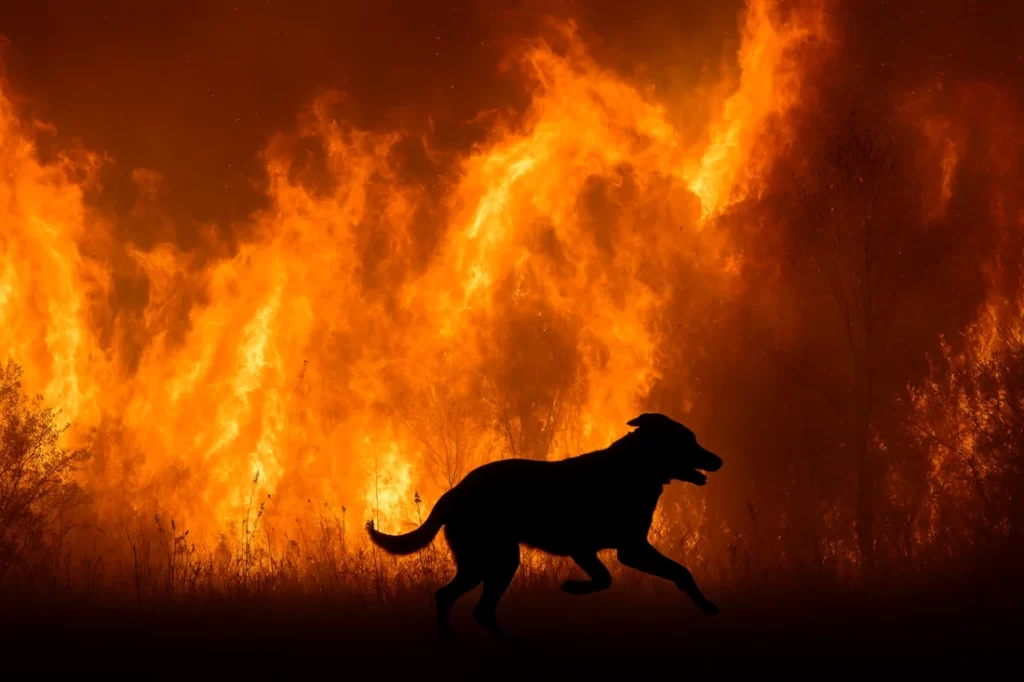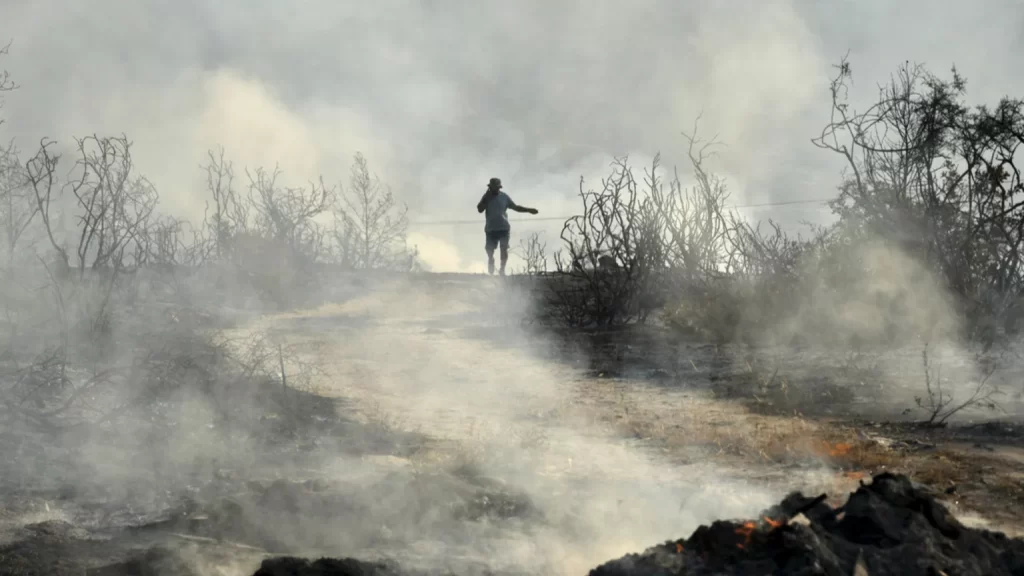“Nobody told us”
Andreas Christou, a 67-year-old local, said there were no alerts—no sirens, no phone calls. “Only the church bell and my neighbour shouting,” he recalled. As flames engulfed the dry hillsides around Monagri and Alassa, the only warning many received came from panicked neighbors, horns blaring, or messages sent across Telegram groups and WhatsApp threads.
Despite years of EU funding and preparedness plans, Cyprus still lacks a functioning public alert system to notify residents in high-risk areas during natural disasters. The 112 emergency alert system—standard across the EU—remains inactive in Cyprus. The government has acknowledged this gap but claimed the fire unfolded under “unprecedented conditions” (Cyprus Mail, 2025).
For Andreas, that explanation doesn’t help. Two of his elderly friends were found burned to death inside their car, trying to escape the fire (Reuters, 2025). Dozens of others were injured, two critically. Nearly 125 square kilometers of land burned in what would become the largest wildfire in modern Cypriot history (FastForward, 2025).
A state of confusion
As fire crews scrambled to respond—ultimately with help from Greece, Jordan, Israel, and Spain—many citizens felt they had been left to their own devices. With temperatures soaring beyond 44°C, and strong, dry winds feeding the fire’s advance, coordinated response proved difficult (AP News, 2025).
Still, it was the absence of early action, not just the intensity of the fire, that stoked public outrage.
According to Kıbrıs Postası (2025), a wave of anger spread online as reports emerged that during the critical early hours of the disaster, government representatives were engaged in diplomatic celebrations, including events connected to Israeli Independence Day.
In the days that followed, opposition leaders called the state’s handling “incompetent” and “absent,” demanding accountability. Government spokesman Konstantinos Letymbiotis, in response, denied negligence and defended the administration’s actions as proportional to the conditions faced (Cyprus Mail, 2025).

A country on fire—and people who stepped up
When fire tore through the hillsides, help didn’t wait for approval. It came from the people.
With government coordination lagging, ordinary citizens turned to social media to mobilize. Telegram channels exploded with calls for water trucks, firefighting volunteers, and supply donations. Convoys of civilians drove toward burning villages carrying tools, blankets, and buckets. Some even joined the fire lines.
But not all efforts were welcomed. Several civilians reported being stopped by police and fined for speeding, even as they rushed to deliver critical aid. While law enforcement maintained they were following standard traffic protocols, critics saw the actions as emblematic of a broader disconnect between institutions and the urgency on the ground.
At the same time, animal rescuers and veterinarians organized around-the-clock operations. They saved and treated 144 dogs and 37 cats in the worst-hit zones, with the island’s Animal Welfare Commissioner coordinating closely with volunteers (Cyprus Mail, 2025). Goats, donkeys, and birds were triaged as well—some survivors, some not.

When business becomes a lifeline
While state institutions hesitated, the private sector moved quickly. XM Group, a Cyprus-based fintech company, pledged €4 million for fire recovery (Cyprus Business News, 2025). Supermarkets like Alphamega and MAS offered shelter, food, and water. Hospitals, hotels, and fuel stations across Limassol opened their doors or donated resources without hesitation. And of course the countless citizens and small businesses that offered accommodation, transportation, aid and fundraised to give back to the communities.
Lessons left in ash
The answer is complicated. Cyprus, like much of the Mediterranean, is on the frontlines of climate change. A hotter, drier region means more fires, more frequently, and more unpredictably (Reuters, 2025). But as extreme weather becomes the new normal, the gap between what is expected of the state and what it currently delivers is growing more visible.
President Nikos Christodoulides promised a full investigation and a renewed investment in emergency infrastructure. A national inquiry is underway. But critics argue that unless this tragedy translates into concrete reform—particularly the implementation of early warning systems and more community-integrated disaster response—future fires will not only be expected, they’ll be inevitable.
For many, the 2025 Limassol wildfires were not just a natural disaster. They were a referendum on readiness, on trust, and on what happens when the fire comes too fast and the alarm sounds too late.

Sources:
AP News. (2025, July 24). Cyprus gets help from other countries to battle huge wildfire that has killed 2.
Cyprus Business News. (2025, July 25). Cyprus business community steps up as wildfires ravage the island.
Cyprus Mail. (2025a, July 27). How on earth did this happen to us?
Cyprus Mail. (2025b, July 24). Letymbiotis denies govt negligence over wildfires, cites ‘unprecedented conditions’.
Cyprus Mail. (2025c, July 26). Veterinary services caring for animals rescued from wildfires.
FastForward. (2025a, July 25). Government faces harsh criticism over wildfire response.
Kıbrıs Postası. (2025, July 26). Public anger grows over wildfire response as Cypriot government faces mounting criticism.
Reuters. (2025a, July 24). Two dead, homes burn in massive wildfire in Cyprus.
Reuters. (2025b, July 29). Sustainable Switch Climate Focus: Wildfires raze the Mediterranean.
Featured image source: EuroNews
Also read: Aradippou farmers donate to support fire-stricken communities
For more videos and updates, check out our YouTube channel.


